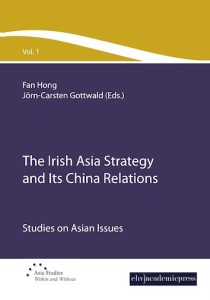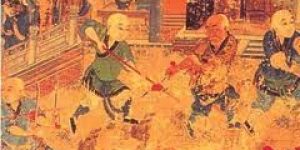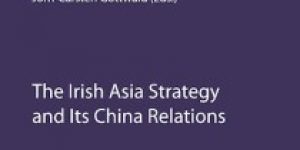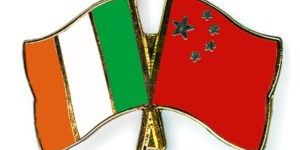Chapter 10: Connecting Cultures – The Role Of Education ~ The Irish Asia Strategy and Its China Relations
No comments yet Introduction
Introduction
Throughout the 1990s education increasingly became an export commodity for “first world” nations. This growth in the international education market was enabled by the increasing wealth in developing nations. The drivers of the trend also included limited availability of higher education places in developing nations; desire to access knowledge and technology; to learn respectable English language skills; and to make foreign contacts. In addition, the roles of fashion and the societal pressure to have foreign educated offspring should not be under-estimated.
Ireland is an English speaking nation with a credible education brand and it was well positioned to benefit from this trend. In recent times, therefore, education has naturally been a constant thread in the main political speeches on Irish/Asian relations and in the key strategy documents on the matter.
The Irish government’s Asia Strategy has been the touchstone of the Irish government’s efforts to build relations and support and stimulate economic and cultural activity with Asia. This short paper reviews and considers the role of education in the Irish government’s Asia Strategy over the decade from its inception in 1999 towards the end of its second 5 year period in 2009, specifically in connection with China. It also reviews the political will, some key events and finally UCC’s practical experience with its Institute of Chinese Studies.
It will be seen that education has assumed an importance wider than simply that of a valuable export sector; rather that it is increasingly recognised as an agent of intercultural awareness and a key enabler of future business relationships.
Ireland’s Asia Strategy has been supported by high level political exchanges. Education was highlighted by these exchanges. Bertie Ahern, Prime Minister of Ireland (the Taoiseach), visited China in January 2005. The Taoiseach was accompanied by the Minister for Education and Science, Mary Hanafin and by the heads of Irish Universities and Colleges. One of the objectives of the visit was “To increase awareness of Ireland’s education system and the links being established between Chinese and Irish institutions” and in the course of the visit agreements were signed in matters of education and scientific research. Bertie Ahern’s speeches were laced with references to education and culture and he made reference to an agreement that had been signed between Shanghai Fudan University and Trinity College Dublin.
When Brian Cowen visited China in 2008 he was similarly accompanied by the Education Minister, this time Batt O’Keeffe. Mr Cowen recognised achievements in the development of educational ties between Ireland and China and concluded, “There have been some important milestones in the rapid development of our bilateral educational cooperation”. He noted the level of activity of Irish Institutions in China and the importance of Chinese students to Ireland.
He hoped the numbers of Chinese students in Ireland would grow but also stated that he wanted to see more Irish students come to study in China as well.
The prominence given to education in speeches on these visits demonstrates awareness at the highest levels of the importance of education in Ireland’s dealings with China. Mr Cowen was speaking at a later moment in the decade of the Asia Strategy and was able to draw on specific examples of progress. Mr Cowen’s wish to see more Irish students studying in China appears to evidence a growing awareness that the opportunity in education in terms of the strategy extended beyond education as an export commodity for Ireland; and that the human contacts he referred to would be the foundation of Irish-Chinese business into the future beyond the impetus of the initial Asia Strategy.
The Asia Strategy, Education and China
The Irish government report “A Decade of the Asia Strategy” reflected on the achievements of the Strategy in its first 5 years from 1999 to 2004. It recognised dramatic increases in key measures including exports from Ireland and the number of Irish companies established in Asia. It also noted that high level reciprocal political visits had taken place and that much effort and resource had gone into raising awareness and into forging long term institutional connections. The document went on to set out the targets and priorities for the second 5 years of the strategy.
This section of this chapter specifically reviews the relevance of education and China in this key document:
1. It recognised that further development of bilateral trade would require “advancement not only of economic and trade relationships but other across… social and cultural dimensions.” The value of Education as an economic and trade commodity will be understood, but it should also be understood that education has relevance in that it is a forum in which social and cultural relationships can be developed.
2. The primary objective for the next 5 years was established as “to intensify the levels of political, business and other forms of interaction with the priority Asian countries so that Ireland benefits to a significantly greater extent from the trade and other benefits.” The potential of education in business and other forms of interaction will be readily appreciated.
3. The report identified China as one of 8 countries for prioritised attention and support. The other priority countries are Japan, Korea, Singapore, India, Malaysia, Indonesia and Vietnam but this paper focuses on China.
4. It noted that the successful establishment of businesses in Asian markets requires “proper planning and resource commitment”; and that “this can present significant challenges for smaller companies.” The reference to resource commitment would include human resources, which would also of course do the planning. Education and academic research have significant roles in providing the required knowledge and human resources for businesses both large and small.
5. It noted the role of ASEM (the Asia Europe Meeting) in political, economic, trade and people to people issues.
6. The report noted projections in increase in students studying abroad and that the greater part of the increase is expected to come from the priority Asian countries. Specifically in relation to China it anticipated 5,000 students by 2009.
7. It advised an Institute of Chinese Studies to enhance the understanding of Chinese language and culture in Ireland was in the process of being established. The outcome of this was the establishment of two Institutes in 2006; one at UCD (University College Dublin); the other at UCC (University College Cork).
8. It noted that “a better understanding of Asia and its peoples is important to the development of sound economic and trading relationships.” The Department of Foreign Affairs would advance proposals for an Institute of Asian Affairs. In practice Irish Educational Institutions have collaborated to establish in an Asia Studies Ireland Association.
9. The report recognised value in international students beyond simply the direct education and accommodation fees:
a) “Graduates and students from the priority Asian countries will now be a valuable resource as this country seeks to strengthen its research and technological base.”
b) An “important network of contacts and trade partners.” It advised that such networks would be supported through alumni associations.
c) It noted a scholarship scheme to attract top Asian graduates and students to Ireland.
d) It recognised the economic benefits of developing education links extend far beyond the tuition and accommodation income. Rather, that there are immediate benefits in additional expenditures by foreign students and a wide range of longer term benefits. The longer term benefits include human resources equipped to drive business between Ireland and its Asian markets.
10. It records a number of measures to encourage development of sustainable educational links including scholarship schemes and the establishment of new Asia-specific Irish Institutes.
It also committed political will behind the strategy and the next section of this paper touches on this aspect.
Guided by this Strategy, the past decade saw rapid growth of exchanges between universities, institutes of technology and independent colleges in Asia and Ireland. The growing number of Asian students who study in Ireland’s higher education sector, especially the increase of Chinese students, is one of the many examples. The Higher Education Authority, the supervisory body for universities and colleges, has reported dramatic increases in the numbers of foreign students in the last decade, especially from China and other Asian countries.[i]
According to a survey conducted by the International Education Board Ireland, 6,314 students from Asia registered for 2003/4 academic year in Ireland’s higher education sector. 2,874 of which were Chinese. By the end of 2004, 35% percent of the international students in Ireland’s higher education sector were from Asia. The number of Asian students registered for the 2005/6 academic year had increased to 8,097 of which the number of Chinese students was 3,411.[ii]
Today, the foreign student market has become a big money spinner for Ireland and Asia is a key market. The students who bring real revenue (about €26,000 each per academic year) to institutions and the economy are students who come from outside the European Economic Area (EEA) and who engage in full-time, long-term study. Even US students, for whom this country is popular, only tend to stay for a semester or a year. The Asian students are the ones who come and complete their degrees, masters and PhDs.[iii]
In addition to the flourishing foreign student market which benefited from the growing number of students from Asia and China, the past decade also saw the rapid development of Chinese studies in Ireland and exchanges between Chinese and Irish higher education institutions.
Below are some of the major achievements:
– An intergovernmental agreement on the Mutual Recognition of Qualifications between China and Ireland was signed in February 2006.
– The establishment of the Irish Institute of Chinese studies in UCC and UCD in 2006.
– The establishment of the Association of Chinese Studies in Ireland in 2006.
– The opening of two Confucius Institutes in Ireland. The Confucius Institute, also known as “Hanban,” is a cultural outreach organisation, funded by the Chinese Government. It operates by supporting partnerships between Chinese and foreign universities. The first Confucius Institute in Ireland had been opened at University College Dublin (UCD) in 2006 in partnership with Renmin (People’s) University. The second opened at University College Cork (UCC) in 2007 in partnership with Shanghai University.
– The establishment of Irish Studies in China. National University of Ireland Maynooth (NUIM) and Beijing Foreign Studies University cooperated to launch an Irish Studies Centre in Beijing in Spring 2007.
– The Establishment of the Sino-Irish Education Centre between NUIM and Beijing University in 2008.
– The signing of an agreement on PhD cooperation between Ireland and China in 2008. The
Irish Universities Association (IUA) and the China Scholarship Council were already active in this area with an agreement for the exchange of PhD students between Ireland and China. The aim was to develop long term strategic research links. Funding was made available for PhD students through the Higher Education Authority’s (HEA) Strategic Innovation Fund and Chinese Scholarship Council.
– The establishment of the Asian Studies Association Ireland (ASIA) in 2008. It aims to develop networks of Asian Studies among Ireland.
– The establishment of the Irish Association of Chinese Teaching and Learning in 2009.
– The establishment of UCC’s School of Asian Studies in September 2009. The School of Asian Studies aims to develop comprehensive undergraduate and postgraduate programs on all aspects of study within the Asian region.
– The establishment of 8 Confucius “Classrooms” in Cork in 2010. The Confucius Classrooms offer Chinese culture and language courses in 24 local primary and secondary schools with over 850 students.
– The establishment of a Confucius Classroom in NUIM in May 2010.
In addition to the above achievements, UCC’s experience will be presented to help understand how Ireland’s Asia Strategy was implemented in universities and the achievements in Ireland so far.
The UCC Experience
Unsurprisingly, the international commercial community is obsessed with China and understanding China has become increasingly globally important. The need for quality education on Chinese matters will be readily appreciated in the context of the consistently growing importance of China, most commonly illustrated by figures for GDP magnitude and growth.
UCC had the vision and ambition to develop the Chinese and Asian Market. With its well developed academic courses; teaching and research expertise; a large and attractive campus; a long-established scholastic tradition; credibility; and a record of delivery at international level, UCC was well equipped to enter the Chinese and Asian markets.
The creation of the Asia Strategy provided UCC with the opportunity to establish the Irish Institute of Chinese Studies (IICS) in June 2006. This section will give some insight into the practical experience of the IICS at UCC.
Given that the impetus for the IICS was the Asia Strategy, the overall objective of the Institute was to implement the “Asia Strategy” and to directly and indirectly contribute to the economic, educational and cultural development of Ireland. This objective would be achieved through the following areas of activity:
1. Produce an Irish generation who can effectively deal with China in the 21st Century.
2. Educate the general public and enhance mutual understanding between Ireland and China.
3. Promote multi-disciplinary research on contemporary issues in China and Greater China.
4. Assist the International Education Office to provide educational opportunity for Chinese students and create a Chinese constituency with knowledge of, affection for, and links with Ireland.
Produce an Irish generation who can effectively deal with China in the 21st Century
The IICS at UCC initiated in just under three years four taught degree programmes in which the students spend their third year at one of our Chinese partner universities including Shanghai University and South China Normal University in Guangzhou. The courses are BA in Chinese Studies, BCom (International) with Chinese Studies, HDip in Contemporary Chinese Culture and Business and MA in Contemporary Chinese Culture and Business.
In order to allow students to develop their academic expertise in a particular area of interest relating to Contemporary China, the IICS also introduced MPhil/PhD & Post-Doctorate Programme. The programme is of particular interest to graduates in social sciences and humanities preparing for a career interacting with China.
The quality of the Institute’s teaching was publicly recognised. The European Award for Languages, a Europe-wide initiative supported by the European Commission, named the IICS at UCC as a winner in 2008 for its excellence, dedication and innovation in Chinese language teaching and learning in Irish Higher Education. By the end of 2009, 165 students were taking BA, BCom, MA and HDip degree courses. The number of PhD students had reached 19 by September 2009.
In addition to delivering degree programmes, the IICS at UCC encouraged integration of the University’s ethnic Chinese and other nationalities. This happens via various media e.g. a learning “buddy” system, where Chinese and Irish students pair and help each other in their studies. A Chinese Studies Society was also established by students from the IICS at UCC. The quality of international relationships formed at UCC demonstrates an intercultural ease that bodes well for the future relationship of the geographical areas.
Educate the general public and enhance mutual understanding between Ireland and China: the role of the UCC Confucius Institute
In this area, in particular, the IICS was assisted by the UCC Confucius Institute which is a joint venture between UCC and Shanghai University since November 2007. Through this medium UCC is privileged to receive support of visiting language teachers and volunteers from Shanghai University; executive support and a library of 4,000 Chinese books. The Confucius Institute also supplies funds for language and cultural activities. It offers a rich programme of language teaching and cultural activities that reaches out to the wider university and public.
The UCC Confucius Institute offers non-degree courses in Chinese aimed at part-time and adult learners in Cork region. The Institute also offers Chinese culture and language courses within 24 local primary and secondary school to over 850 students. In 2009, the Institute introduced a Chinese Language Teaching Centre and HSK Examination Centre into the university giving students the opportunity to take the official Chinese language proficiency tests.
The Confucius Institute at UCC has organized a series of promotional Chinese language and cultural based activities, which has received positive feedback from local government and organisations. Major events and activities involving the UCC CI include:
– Co-hosting the 2009 Spring Festival Chinese Cultural experience with the Irish Chinese Contact Group. Approximately 130 Irish Chinese Contact Group (ICCG) families, all together five hundred parents and children celebrated Spring Festival and experienced Chinese language and culture together.
– Organized a Chinese language and culture experience for secondary and primary school students of Cork. Over two hundred students and teachers were invited to the Confucius Institute at UCC for a glimpse of Chinese Culture and language. This helped promote the teaching of Chinese language and culture in secondary and primary schools.
– Held the second “Chinese Bridge” language competition in Ireland, which was also the preliminary competition in Ireland for the 8th Chinese Bridge Language Competition of Worldwide College Students being held in Changsha, China. UCC Student Kenneth
Brown won the opportunity to represent Ireland in the next stage of the competition.
– In summer 2009, the Institute organised a Summer Camp in China for Irish university students and 60 Irish students participated. This was the first programme of its kind to be co-ordinated out of UCC.
– Presented scholarships to enable 9 Irish university students to study either half or full year terms in Chinese universities. The scholarships were co-organized by the Confucius Institute to encourage further scholarly exchange between students of both countries and to further highlight interest in Chinese language and culture.
– Organized a pairing study party for the Chinese and foreign language learning students, who are currently studying in UCC in October 2009. The party stimulated communication between Chinese students and students of Chinese.
– Co-hosted the 60th Chinese National Day Anniversary Reception with UCC International Office. The reception attracted over four hundred people from UCC and from the general public.
– Co-hosted the Cork & Shanghai “Threads Through History” exhibition at Cork City Public Museum with Cork City Council in October 2009. The exhibition lasted for 7 weeks and attracted more than 1,000 visitors.
– Co-organized a public lecture on Acupuncture and Chinese Medicine on 20th January 2010. More than 70 people attended the lecture.
– Co-organized the 2010 Spring Festival Party in January 2010, attended by over 800 people at the City Hall in Cork City. The event presented to the Cork public an array of musical, theatrical and artistic presentations from Shanghai University Arts Troupe representing different multi-cultural facets of Chinese life. It brought together official representatives including the Lord Mayor of Cork Councillor Dara Murphy, the Ambassador of the Peoples Republic of China HE Mr. Liu Biwei and President of UCC Dr Michael Murphy.
Promote multi-disciplinary research on contemporary issues in China and Greater China
The IICS has become a significant centre of Chinese Studies in Europe. The Institute emphasizes its research plan and actively cooperates with other UCC departments and with universities in UK, Europe, China, Indonesia and other Asian countries. During the past four years, the IICS held a series of high level academic communication activities concerning China and Asia. By inviting contributions from academics and researchers culminating with the Irish Asia Ambassadors Roundtable Forum in 2009, the Institute has grown in stature and has become a key organization at the centre of Chinese and Asian studies in Ireland.
Aimed at promoting research on China and its relationship with Ireland, Europe and the World, the IICS held its inaugural international conference, entitled “CHINA in the 21st Century: Culture, Politics, Business”, in June 2007. Delegations from China, UK, South-East Asia, the US, and Europe participated in the event at UCC.
IICS’s second annual international conference, The Rise of Asia and its Challenge for Europe, was held by UCC in November 2008. The aim of the conference was to bring academics from Asia and Europe together with representatives from Irish government and business. The Lord Mayor of Cork, Mr Brian Bermingham, UCC President, Dr Michael Murphy, Micheál Martin, TD, Minister for Foreign Affairs and Ambassadors from several Asian countries attended the conference.
Together with the International Journal of the History of Sport (IJHS), Routledge, the Asia-Europe Foundation (ASEF) and the UCC Confucius Institute, the IICS at UCC organised the international conference: “Post Beijing 2008: Geopolitics, Sport, Pacific Rim” in March 2009. Distinguished academics from over ten universities, including Cornell University, Pennsylvania State University in USA, UCC and Shanghai University China, presented and contributed to the conference on the following topics: The Relationships Between Sport and Politics; Influence on Sport with Development of the Society; and the Significance of the Beijing Olympics for the Geo-Political Future of the Pacific Rim.
A Roundtable Forum of the Asian Ambassadors was organised by the IICS in October 2009. Ambassadors of China, Japan, Korea, India, Iran and Malaysia presented upon invitation. Delegates from the Irish Ministry of Foreign Affairs, the president of UCC, and scholars and researchers from UCC also presented.
The IICS co-presented the third annual conference of the Asian Studies Ireland Association (ASIA), entitled The Transformation of Asia in a Changing Global Environment, with the Asian Studies Ireland Association in November 2009. The conference saw some 60 participants, including academics from Britain, France, USA, and China as well as teachers and students from UCC. The conference ran a series of panel-based workshops and seminars, which focused on the impact of the global economic crisis on the Asian economies, the different responses of the various Asian governments to the crisis and the different perceptions of the crisis between European and Asian societies.
Besides the above academic conferences, the IICS also promoted multi-disciplinary research on contemporary China by carrying out scholar and student exchange programmes. The Institute has received 6 visiting scholars from the Chinese Service Centre for Scholarly Exchange, Ningxia provincial government, Yunnan University and South China Normal University since 2008. Since 2009, the Institute has actively taken part in the State-Sponsored Postgraduate Project of China for Advanced Universities, by receiving four PhD students from China People’s University, Shanghai University, Suzhou University and Beijing Sport University.
Assist UCC’S International Office
The IICS at UCC and the International Office have supported each other to create an environment in which the traditional role of accepting students has been changed and where interconnected global culture is celebrated at UCC- a 21st century international university.
Reflecting now on the Government’s ‘Asian Strategy’
– Marketing Education Services- The IICS is providing ongoing support and adding to the attractiveness of UCC.
– Establish an Irish Institute of Chinese Studies- Done and ongoing.
– Increase the number of College to College links- Ongoing at several levels including student placement and research co-operation.
– A scholarship scheme for top Asian graduates- The IICS’s PhD programme is already attracting graduates and the Institute will be pleased to play an active role in expanding post-graduate activity.
– Promote Alumni associations and networks- the IICS at UCC will enhance the value and sustainability of these networks by virtue of the cross-cultural relationships that our activities build.
– A focused Placement Programme of Irish Graduates- we carry this out at undergraduate level.
– To advance proposals for an Institute of Asian Affairs: UCC has already established its school of Asian Studies. In addition, as a platform of cross-cultural communication between China and Ireland and having received over 20 various visiting delegations from China in 2009, the IICS at UCC has been functioning successfully as a bridge over cultures, and as a promoter of Sino-Irish communication in politics, economy, culture and education. The delegations are listed below:
– South China Normal University Delegation (March 2008)
– Shanghai Sport University Delegation (November 2008)
– Delegation of Shanghai Shanghai Municipal Transport Bureau (July 1st 2009)
– Shanghai Pudong Construction & Transport Committee (July 6th 2009)
– Shanghai Federation of Industry and Commerce (August 17th 2009) – Cork Chamber
– Shanghai Chamber of International Commerce (August 27th 2009) – Cork Chamber
– Shanghai Civil Affairs Bureau (September 21st & 22nd 2009)
– Shanghai Municipal People’s Congress Standing Committee (October 12th 2009)
– Shanghai Women’s Federation (October 15 & 16th 2009)
– Shanghai Xuhui District Government (October 19th 2009)
– Shanghai Minhang District Government (October 21st 2009)
– Shanghai Putuo District Government (November 2nd 2009)
– Shanghai Leadership Association (November 3rd 2009) – Cork Chamber
– Shanghai Zhabei District Government (November 5th 2009)
– China National People’s Congress Delegation (November 14, 2009)
Overall, the process of building the Irish Institute of Chinese Studies at UCC has been an immensely rewarding one. It has clearly fuelled a demand for the subject and our students have a strong sense of mission that they are preparing to pathfind for Ireland in the changing economic and political landscapes of the 21st Century.
 The Future of Education in a Strategy for Asia
The Future of Education in a Strategy for Asia
The present Strategy is clear on the basic educational tools for developing Ireland’s capacities and on the opportunities to do business with Asia. It acknowledges both the immediate commercial educational opportunities and also the longer term importance of relationships. It has focused on developing business volumes, relationships and institutions.
The globalization of economy, cultural, political and intellectual institutions is a major force for change in education. In an era of globalization and with the rise of Asia, the world is moving towards the challenge and opportunity of the East. Education moves there too. Asian studies, especially Chinese studies, are becoming more and more popular around the globe. In the higher education sector, almost all the leading universities in America, Europe, Asia, Oceania and Africa have established their centres for Chinese Studies. The rising demand for Chinese language and culture teachings has been receptive to hundreds of Confucius Institutes. The first Confucius Institute was established by Hanban in South Korea in November 2004. By March 2009, a total of 256 Confucius Institutes and 58 Confucius Classrooms had been established in 81 countries around the world.
Chinese language teaching is also flourishing in Primary and Secondary education sectors in the West. In England in 2007 more than 10% of secondary schools were teaching Mandarin at some level and 1,827 children sat Mandarin Chinese at General Certificate of Secondary Education (GCSE) level in 2006. In addition 3,034 adults sat the GCSE examination and 392 students were admitted to Chinese undergraduate programmes. Meanwhile, the UK’s “Specialist Schools and Academies Trust” has signed an agreement with Hanban, the executive body of the Chinese Language Council International, to promote Mandarin in UK Schools.
England is an example of the context in which Ireland Inc must compete for future market share in China. To continue to proactively respond to Chinese opportunities, Irish efforts in Chinese education must be redoubled by formally promoting Chinese language and culture in the curriculum of secondary schools in Ireland and should be included in the “Language Initiative” programme.
The 2004 review concluded that the most important indicator of success at the end of 2009 will be the extent to which Ireland has further developed its export trade with the priority Asian countries. However, the business levels and relationships envisaged by the strategy will increasingly be sustained and developed by new generations. Therefore, in the years to come, Ireland should aim also to judge the success of the Strategy by measuring the number of its citizens that it has educated for these endeavours.
The recently formed Asia Studies Ireland Association is a positive move in promotion of Asian Studies in Ireland. The Asia Strategy intimated the creation of the Irish Institute of Asian Affairs. However, the experience in UCC shows the natural progression from Chinese Studies to Asian Studies. In practice this work is already underway. The UCC school of Asian Studies offers the opportunity to the Government in this regard. It will work with relevant parties to consolidate its educational, research and outreach programmes. It will continue to work with its various partners including the Asian embassies in Ireland; the Confucius Institutes in Asia; and partners in China and other Asian countries to promote education and cultural exchange between Ireland, China and Asia. It will continue in its endeavours to play the educational role envisaged in Ireland’s Asia Strategy and will do its part to ensure that Ireland is globally competitive in terms of its ability to deal with China and Asia.
NOTES
[i] Abel Ugba, ‘Active Civic participation of Immigrants in Ireland’, Country Report prepared for the European research project Politics, Ildenburg 2005.
[ii] International Education Board Ireland, ‘International Students in Higher Education in Ireland 2004’. July 2004.
[iii] ‘Has Ireland dropped the ball on attracting international students?’ The Irish Times – Tuesday, January 26, 2010.
About the Author:
Fan Hong is Winthrop Professor in Asian Studies and Director of Confucius Institute at the University of Western Australia. She received her BA and MA in China and PhD in UK. She was Professor in Chinese Studies at De Montfort University in England before she moved to University College Cork, National University of Ireland in June 2006.From 2006 to 2013 she was the funding Director of Irish Institute of Chinese Studies and the Confucius Institute, and Head of the School of Asian Studies at University College Cork. Under her leadership the Confucius Institute was awarded the prestigious title the ‘Confucius Institute of the Year’ in 2011. She was the president of the Asian Studies Association Ireland from 2009 to 2013.
She is academic editor of The International Journal of the History of Sport published by Routledge which is included in the Social Science Citation Index. She is editor of the book series Asian Studies – Within and Without published by EHV. She is also a member of various editorial boards including Sport, Policy and Politics and the International Encyclopaedia of Women and Sport. She was the member of the Education Commission of the World Anti-Doping Agency (WADA) between 2001-2003.
Her main research interests are in the areas of culture, politics, gender and sport and she has published more than 20 books and 60 journal articles in these areas.
See also: http://www.confuciusinstitute.uwa.edu.au/
Previously published in: Fan Hong, Jörn-Carsten Gottwald (Eds.) – The Irish Asia Strategy and Its China Relations 1999-2009. Amsterdam, 2010.
You May Also Like
Comments
Leave a Reply








